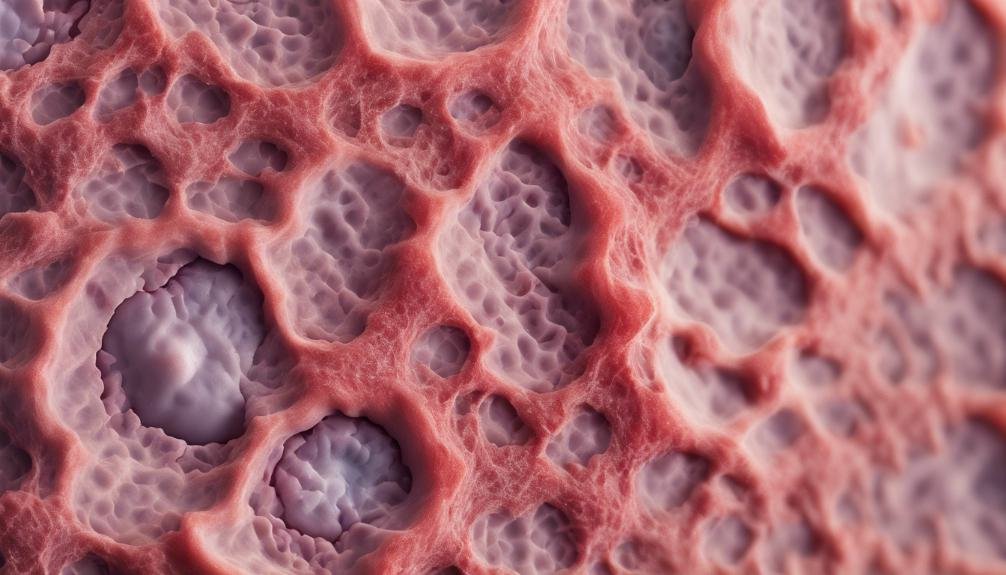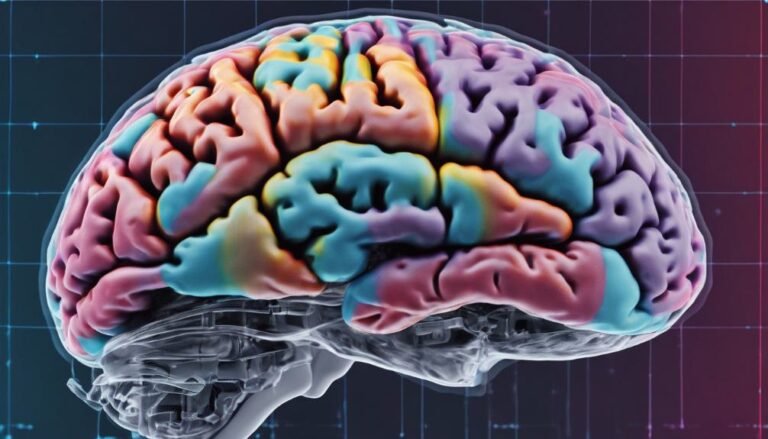AI in Dermatology Imaging
In the field of dermatology, AI in imaging has become a game-changer, ushering in a new era of precision and efficiency. Imagine a tool that can analyze skin lesions with unparalleled accuracy, swiftly flagging potential risks before they escalate. The impact of this technology on patient care is undeniable, but what about the broader implications it holds for the future of skin health? Let's explore how AI is reshaping the landscape of dermatology and what it means for both patients and practitioners alike.
Key Takeaways
- AI in dermatology imaging aids in early skin cancer detection.
- Machine learning algorithms analyze skin lesions for accurate diagnoses.
- AI image recognition differentiates various skin conditions.
- AI technology streamlines the diagnostic process for improved patient care.
- AI enhances diagnostic accuracy, leading to personalized treatment plans.
The Role of AI in Dermatology
When it comes to skin cancer detection, AI algorithms have proven to be highly effective in analyzing images of skin lesions to identify potential malignancies. By precisely analyzing various features of skin lesions, such as asymmetry, border irregularity, color variation, and diameter, AI can assist dermatologists in making more accurate diagnoses.
Additionally, AI algorithms excel in the detection and classification of various skin conditions. Through image analysis, AI can differentiate between different types of skin conditions, such as eczema, psoriasis, and melanoma, with a high level of accuracy.
This capability not only aids in providing timely and accurate diagnoses but also helps in developing personalized treatment plans for patients based on their specific skin condition.
Advantages of AI Imaging Technology
The capabilities of AI imaging technology in dermatology showcase a myriad of advantages for enhancing diagnostic accuracy and treatment efficacy. Image recognition powered by artificial intelligence enables swift and accurate analysis of skin lesions, aiding in the early detection of skin cancer. These advanced image recognition algorithms can identify subtle patterns and features that may be imperceptible to the human eye, leading to more precise diagnoses.
Moreover, AI imaging technology offers a non-invasive method for monitoring skin lesions over time, allowing for the timely assessment of treatment effectiveness and disease progression. By incorporating machine learning algorithms, dermatologists can leverage vast amounts of data to improve the accuracy of their diagnoses and personalize treatment plans for patients.
In essence, the integration of AI imaging technology in dermatology not only streamlines the diagnostic process but also enhances the overall quality of care by providing dermatologists with powerful tools for early detection and treatment of skin conditions like skin cancer.
Diagnostic Accuracy Enhancement
Improving diagnostic accuracy through AI imaging technology in dermatology greatly enhances the efficiency and precision of skin lesion analysis. Machine learning algorithms, a subset of artificial intelligence, have revolutionized clinical practice by aiding in the identification and classification of skin conditions. These algorithms excel in image recognition, allowing for more accurate diagnoses based on visual data.
AI's role in dermatology extends beyond traditional diagnostic methods, offering a sophisticated approach to analyzing skin lesions. By leveraging vast datasets to train algorithms, machine learning models continuously improve their diagnostic accuracy. This advancement minimizes human error and subjectivity, leading to more reliable results in dermatological assessments.
The integration of AI technology in dermatology not only enhances diagnostic accuracy but also streamlines the diagnostic process. Rapid and precise identification of skin conditions can expedite treatment decisions and improve patient outcomes. As AI continues to advance, its impact on diagnostic accuracy in dermatology is poised to redefine clinical practices and elevate standards of care.
Early Detection Capabilities
Enhancing early detection capabilities in dermatology, AI imaging technology plays a pivotal role in identifying skin abnormalities swiftly and accurately. By leveraging machine learning algorithms, AI systems can analyze vast amounts of dermatological images to detect subtle patterns indicative of skin cancer, particularly melanoma.
Through advanced image analysis techniques, these systems can identify suspicious lesions with a high level of accuracy, aiding in the early diagnosis of potentially dangerous skin conditions.
The integration of AI in dermatology imaging allows for the rapid assessment of skin lesions, providing dermatologists with valuable insights to make informed decisions regarding patient care. By detecting skin cancer at its early stages, AI technology contributes significantly to improving patient outcomes and survival rates.
Additionally, the ability of AI systems to continuously learn and adapt enhances their performance over time, further refining their capacity for early detection of skin abnormalities. This innovative approach holds immense promise in revolutionizing the field of dermatology by augmenting diagnostic capabilities and ultimately saving lives.
Streamlining Diagnosis Process
You can enhance the efficiency of diagnosing skin conditions by implementing AI technology in dermatology imaging. This integration allows for faster and more accurate diagnoses, ultimately leading to improved patient outcomes.
Streamlining the diagnosis process through AI can revolutionize the way dermatological conditions are identified and treated.
Faster Diagnostic Accuracy
AI algorithms in dermatology imaging have greatly expedited the process of diagnosing skin conditions by rapidly analyzing and interpreting medical images. The integration of AI in dermatology not only enhances diagnostic accuracy but also allows for remote consultations, offering telemedicine benefits. Through AI integration, healthcare providers can access expert opinions remotely, leading to improved patient care and outcomes. This streamlined approach to diagnosis not only saves time but also guarantees precision medicine opportunities for patients.
The speed and accuracy at which AI algorithms can analyze dermatological images revolutionize the diagnostic process. By swiftly identifying patterns, anomalies, and potential diseases in medical images, AI enhances the efficiency and effectiveness of dermatological consultations. This not only benefits healthcare professionals by providing valuable insights but also empowers patients by offering quicker diagnoses and tailored treatment plans.
The utilization of AI in dermatology imaging paves the way for a future where remote consultations are seamless, precise, and accessible, ultimately enhancing the quality of care provided to individuals with skin conditions.
Improved Patient Outcomes
The swift analysis of dermatological images by AI algorithms not only expedites the diagnostic process but also greatly contributes to improving patient outcomes by streamlining the diagnosis process. AI-driven dermatology imaging enhances treatment effectiveness by providing accurate and timely assessments, leading to more targeted and efficient interventions. This precision results in higher patient satisfaction as individuals receive quicker diagnoses and personalized care plans, instilling confidence in the treatment process.
Moreover, the streamlined diagnostic process facilitated by AI technology leads to cost savings for both patients and healthcare systems. By reducing the time taken for diagnosis and treatment initiation, AI in dermatology imaging can potentially lower overall healthcare costs. Additionally, the improved efficiency in diagnosis enhances healthcare accessibility by enabling more patients to receive timely evaluations and interventions, ultimately leading to better health outcomes for a broader population.
AI's impact on dermatology imaging transcends mere technological advancement, significantly influencing patient outcomes, cost-effectiveness, and healthcare accessibility in a transformative manner.
Personalized Treatment Recommendations
Tailored treatment plans based on individual patient characteristics are revolutionizing the field of dermatology through the implementation of AI-driven personalized recommendations. Treatment customization plays a pivotal role in enhancing patient engagement and overall treatment efficacy. By harnessing the power of data analysis, AI systems can analyze vast amounts of patient data to identify patterns, predict outcomes, and recommend personalized treatment options.
With the integration of AI in dermatology, healthcare providers can now offer treatments that are specifically tailored to each patient's unique needs. This level of customization not only improves patient outcomes but also enhances patient satisfaction and adherence to treatment plans.
Through continuous data analysis, AI algorithms can adapt and evolve, ensuring that treatment recommendations remain up-to-date and aligned with the latest research and advancements in dermatology.
Current Applications in Dermatology
In modern dermatology practices, various innovative applications are reshaping the landscape of skin health management. AI algorithms have greatly advanced skin cancer detection by analyzing images for signs of malignancy with high accuracy.
Through image analysis, dermatologists can now efficiently diagnose and monitor various dermatological conditions, including melanoma, psoriasis, and eczema.
AI algorithms play an essential role in automating the process of detecting skin cancer by rapidly analyzing vast amounts of dermatological images. This technology aids in the early detection of skin cancer, leading to timely intervention and improved patient outcomes.
Additionally, AI-powered image analysis tools can assist dermatologists in distinguishing between benign and malignant lesions, reducing the chances of misdiagnosis.
AI's Impact on Patient Outcomes
AI's integration into dermatology imaging has greatly impacted patient outcomes by revolutionizing the early detection and diagnosis of skin conditions. Through advanced algorithms, AI systems can analyze vast amounts of dermatological data with incredible accuracy, leading to quicker identification of skin abnormalities and improved patient outcomes.
Patient engagement has also been positively influenced by AI in dermatology imaging. With AI-enabled tools, patients can actively participate in their healthcare by accessing personalized skin health information and tracking their conditions remotely. This increased involvement can result in better adherence to treatment plans and overall improved outcomes.
Furthermore, the implementation of AI raises important considerations regarding data privacy. As AI systems rely on extensive patient data for analysis, maintaining strict data privacy measures is vital to protect patient information. Healthcare providers must make sure that patient data is securely stored and only accessed by authorized personnel to uphold patient trust and confidentiality in the era of AI-driven dermatology imaging.
Future Implications in Skin Disorders
With advancements in dermatology imaging technology, the future implications in skin disorders are poised to revolutionize diagnostic accuracy and treatment efficacy.
AI's potential in skin disorder management brings both opportunities and challenges. Ethical considerations play an important role in ensuring patient privacy and consent regarding the use of AI in dermatology imaging. It's essential to address issues such as bias in algorithms and the need for transparency in decision-making processes. AI limitations, such as the inability to replicate human intuition and clinical judgment, must be acknowledged to prevent overreliance on technology.
Cost implications also need to be considered, as implementing AI in dermatology imaging may require significant financial investment. Healthcare providers must assess the affordability and sustainability of integrating AI into their practice.
Additionally, data security becomes a paramount concern with the use of AI, requiring robust measures to safeguard patient information from potential breaches. As the field of dermatology embraces AI, careful attention to these factors will be essential for maximizing the benefits while mitigating risks.
Transforming Dermatology With AI
Revolutionizing the field of dermatology, artificial intelligence technology is transforming the way skin disorders are diagnosed and treated. AI-driven innovation has paved the way for significant advancements in clinical applications within dermatology. Machine learning algorithms have proven to be instrumental in the accurate analysis of skin conditions, offering a more efficient and precise approach compared to traditional methods.
Through the utilization of AI algorithms, healthcare providers can now streamline the diagnosis process, leading to quicker and more effective treatment plans. These advancements haven't only improved diagnostic accuracy but have also enhanced the overall patient experience by reducing wait times and increasing access to specialized care.
Furthermore, AI-driven innovation in dermatology has the potential to revolutionize how skin disorders are managed, offering personalized treatment options based on individual patient data. By harnessing the power of machine learning in skin analysis, healthcare professionals can deliver targeted interventions that cater to the specific needs of each patient, ultimately enhancing outcomes and quality of care.
Conclusion
To sum up, AI in dermatology imaging has revolutionized the field by enhancing diagnostic accuracy, enabling early detection of skin conditions, and streamlining the diagnosis process.
But, have you ever wondered how this technology will continue to shape the future of dermatological care? As AI continues to evolve and improve, the possibilities for transforming patient outcomes and treatment effectiveness are limitless.
The future of dermatology is unquestionably brighter with AI at its forefront.







